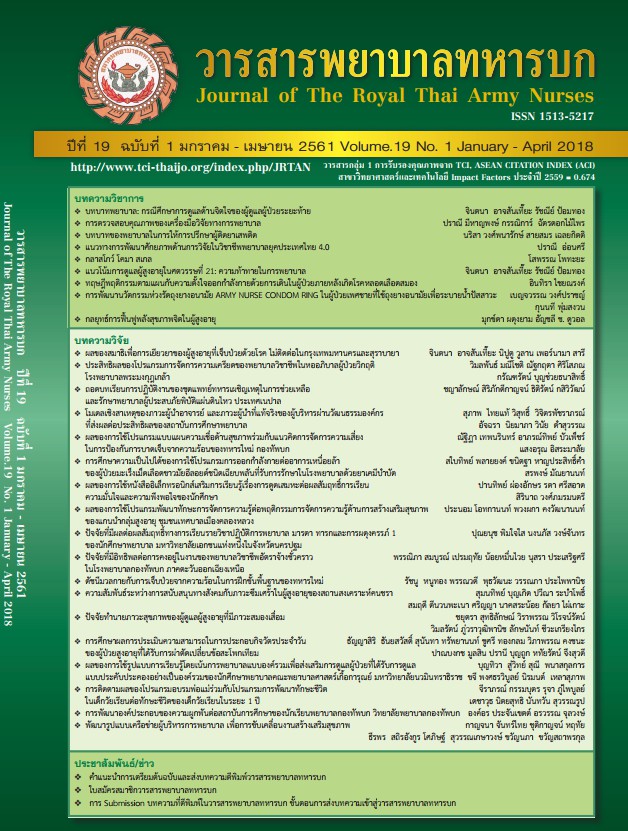การติดตามผลของโปรแกรมอบรมพ่อแม่ร่วมกับโปรแกรมการพัฒนาทักษะชีวิตในเด็กวัยเรียนต่อทักษะชีวิตของเด็กวัยเรียนในระยะ 1 ปี
Abstract
การวิจัยกึ่งทดลองนี้มีวัตถุประสงค์เพื่อศึกษาผลของโปรแกรมอบรมพ่อแม่ร่วมกับโปรแกรมพัฒนาทักษะชีวิตในเด็กวัยเรียนต่อคะแนนเฉลี่ยทักษะชีวิตของเด็กวัยเรียนหลังสิ้นสุดโครงการ 6 เดือนและ 1 ปี ซึ่งเก็บข้อมูลต่อเนื่องจากงานวิจัยเดิม กลุ่มตัวอย่างถูกเลือกโดยการสุ่มแบบเฉพาะเจาะจงพร้อมทั้งพ่อแม่ กลุ่มทดลองซึ่งประกอบด้วยนักเรียน 26 คนและพ่อแม่ และกลุ่มเปรียบเทียบ 27 คนและพ่อแม่ นักเรียนทั้ง 2 กลุ่ม ได้รับการอบรมทักษะชีวิต ในขณะที่เฉพาะกลุ่มพ่อแม่ในกลุ่มทดลองเท่านั้นที่ได้รับการอบรมในโปรแกรมอบรมพ่อแม่เพื่อพัฒนาทักษะชีวิตในบุตรวัยเรียนตั้งแต่ในการวิจัยเดิม ซึ่งโปรแกรมทั้งสองสร้างขึ้นบนกรอบแนวคิดทฤษฎีพฤติกรรมตามแผน และทำการเก็บรวบรวมข้อมูลต่อจากการทดลองก่อนหน้าที่ระยะ 6 เดือน และระยะ 1 ปีวิเคราะห์ข้อมูลด้วยสถิติวิเคราะห์ความแปรปรวนแบบวัดซ้ำ ผลการวิจัยพบว่า ภายหลังสิ้นสุดการทดลองแบบวัดซ้ำต่อเนื่องที่ระยะ 6 เดือน และ 1 ปี พบว่า คะแนนเฉลี่ยทักษะชีวิตทั้ง 2 กลุ่มแตกต่างกัน และกลุ่มทดลองมีคะแนนเฉลี่ยสูงกว่ากลุ่มเปรียบเทียบอย่างมีนัยสำคัญ (p <.05) จากผลการศึกษาแสดงให้เห็นว่า โปรแกรมการพัฒนาทักษะชีวิตที่ศึกษานี้ อาจต้องการเวลาที่ยาวนานขึ้นในการปรับพัฒนาทักษะชีวิตในเด็กวัยนี้ ข้อเสนอแนะในการศึกษาครั้งต่อไปคือการใช้จำนวนกลุ่มตัวอย่างที่มากขึ้นและใช้การวัดผลในระยะยาว
One-year Follow-up Effect of A Parent Training Program in Conjunction with a Life Skills Training Program on The Life Skills of School- Age Children
A quasi-experimental design followed the life skills mean scores over a one-year period. Followed to the prior study, the purposive sampling was used to recruit the sample. Fifty-three sixth graders and their parents were still recruited and selected in both groups, comprising 26 sixth graders and their parents in the experimental group and 27 sixth graders and their parents in the comparison group at the follow-up intervention periods. Two data-collecting were conducted to examine the long-term effects of the interventions in extended period as well as six and twelve month after the intervention. The repeated measures ANOVA were used to test the effect. Significant effects, albeit modest in magnitude, were found on child life skills at the sixth and twelfth month after the intervention. The results presented significant difference in life skill mean scores over time between groups and significantly higher than at each of the times extended over a one-year period within group (p< .05). By obtaining long-term follow-up to evaluation the program, it presented a more reliable test of the effect of the family-based intervention on child outcome. These findings suggest this family-based intervention require a longer duration for outcome measurements.
Downloads
Downloads
Published
How to Cite
Issue
Section
License
บทความหรือข้อคิดเห็นใดใดที่ปรากฏในวารสารพยาบาลทหารบกเป็นวรรณกรรมของผู้เขียน ซึ่งบรรณาธิการหรือสมาคมพยาบาลทหารบก ไม่จำเป็นต้องเห็นด้วย
บทความที่ได้รับการตีพิมพ์เป็นลิขสิทธิ์ของวารสารพยาบาลทหารบก
The ideas and opinions expressed in the Journal of The Royal Thai Army Nurses are those of the authors and not necessarily those
of the editor or Royal Thai Army Nurses Association.






